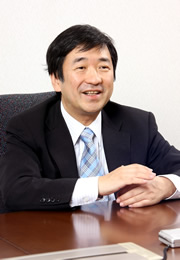2010/09/03
“Sensors” determine the success of robots
Professor Isao Shimoyama
(Department of Mechano-Informatics)

Professor Shimoyama is one of the renowned Japanese researchers in the field of “MEMS,” the promising microfabrication technology to realize the nano and micro world. While many researchers focus on total systems in robot research such as humanoids, he positions sensors as a key success factor in robot systems. He aspires, by realizing intelligence with embedded sensors equivalent of the human five senses, to develop robots that perform tasks safely and reliably as expected by humans and that anyone can use safely at any time. His research focuses on developing such sensors with MEMS technology.
In order for robots to perform a variety of tasks at home such as washing dishes or clothes, they need to be equipped with sensors to detect chemical quantities (odor and flavor) equivalent to the human senses of smell and taste besides vision, touch, and hearing, and proximity sensors to detect when approaching obstacles such as a wall. If these sensing functions equivalent to human five senses are embedded into robots, human-friendly support will be available. Professor Shimoyama pursues the challenging research to allow the entire skin to have a sensing function by embedding a number of sensory functions under a single layer of skin. The research has identified principles of sensory functions including vision and touch. It would however take 10 years to incorporate them into sensors and operate them as a robot system.
He also conducts research on the flapping mechanism of insects and brings new perspective to the next generation by applying it to science through measurement and control research of living organisms. He advocates the importance of scientific research and says “Studying the flapping mechanism is a science. Knowing what was unknown before is useful to clarify other mysterious phenomena. The key to solve social challenges is the amount of knowledge. That is why it is important to challenge to the undiscovered science.” Professor Shimoyama deeply pursues both engineering and science.